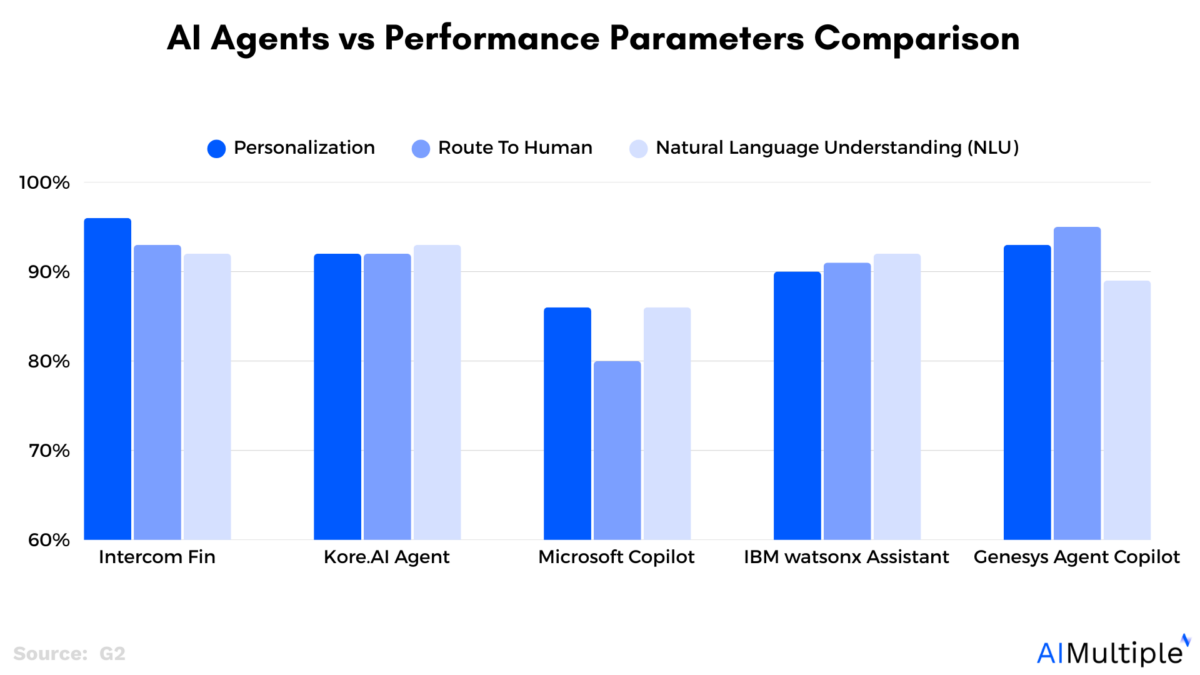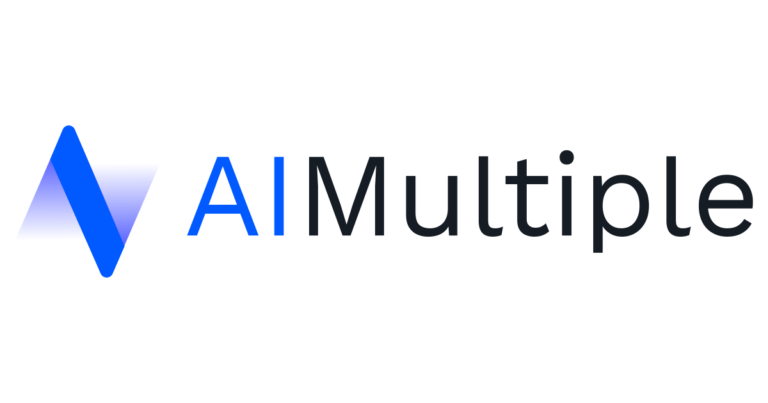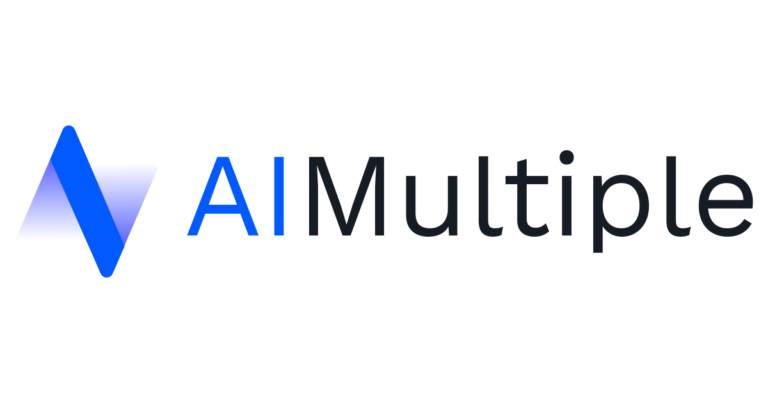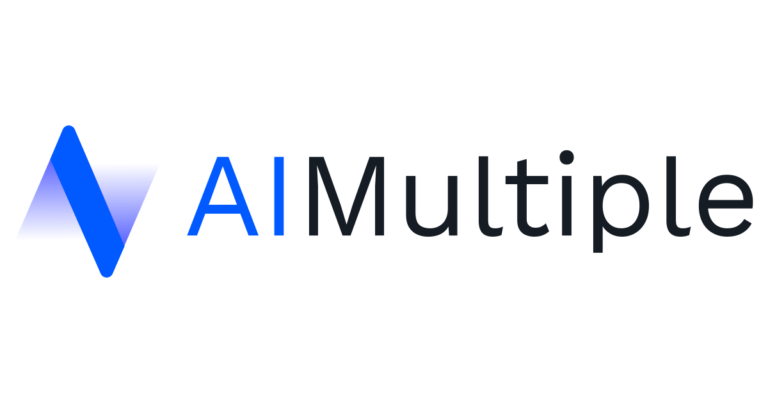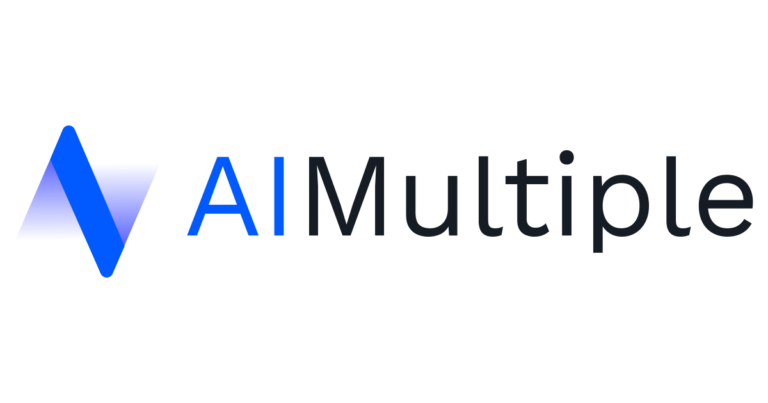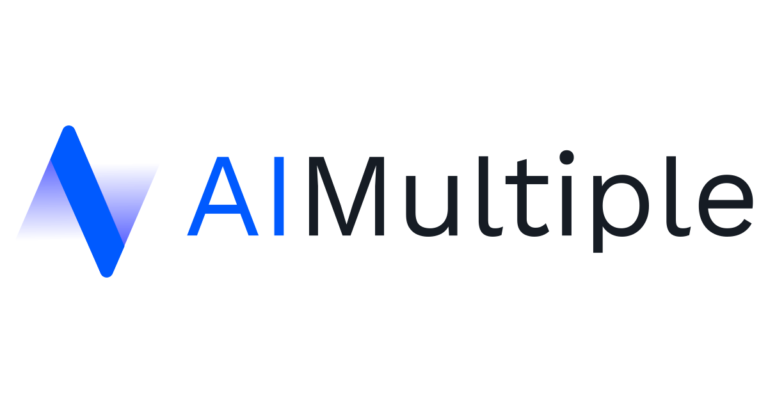Compare Best 5 AI Agents in Customer Service in 2025
AI agents powered by large language models (LLMs) can respond to customer queries in natural language, interpret context, and generate human-like responses. These agents can process and synthesize large volumes of information from sources such as knowledge bases.
Based on user evaluations here are the best AI agents for customer service (a higher rating is better):

Ratings represent reviewers’ overall satisfaction with each feature and do not necessarily consider the breadth of individual product features. See rating methodology. See the description for parameters.
Before diving into a deeper analysis of each framework (below), here is my high-level overview of each one and its potential suitability for your specific use case:
- Intercom’s Fin: An agentic AI copilot for enterprises, powered by Anthropic’s Claude.
- Kore.AI Agent: An enterprise-level Conversational AI platform for contact center automation. It offers smart routing, real-time agent help, and automated QA for rental, finance, and healthcare sectors.
- Microsoft Copilot AI: You can set up the agent with SharePoint integration with minimal technical input. The agent uses GPT-4. The AI responses are more contextually relevant than traditional solutions like Copilot Studio. Sometimes struggles with complex wording.
- IBM watsonx Assistant: Best for handling complex customer queries and support tickets. Specific use cases include customer support, HR, and marketing operations.
- Genesys Agent Copilot: Best for contact center operations. Offers inbound agents (who handle incoming customer calls), outbound agents (who make calls to customers), sales agents, and support agents.
Read more: Enterprise AI agents, Agentic AI, AI agent builders, large action models (LAMs).
>Leading examples of AI agents in customer service

Fin is ideal for companies that deal with a high number of repetitive support tickets or routine questions. Intercom Fin:
- Answers more types of complex questions across channels
- Uses multi-source generative answers to construct more thorough responses
- Adapts to support the team’s tone of voice
- Implements support policies when needed
- Personalizes answers with contextual customer information
- Takes action in external systems
Pros:
- Simple setup, no technical skills needed (custom actions are optional).
- High answer quality with AI-generated responses.
Cons:
- Expensive pricing at $0.99 per resolution, which rises as the AI improves.
- Alternatives, like the Intercom AI Agent app, charge $0.10 per conversation.
Kore.AI Agent

Kore.ai’s Agent enhances agent efficiency with generative AI by automating workflows and offering real-time guidance:
- Next-best action suggestions to improve interactions and outcomes.
- Real-time adaptive coaching to enhance support representative’s performance.
- Guided playbooks to support reps to follow best practices for compliant service.
Pros:
- The platform requires minimal knowledge of NLP and LLM needed to configure bots.
- Kore.ai provides extensive customization options through its SDK.
- Kore.ai is well-suited for enterprises, with out-of-the-box solutions for IT tasks (like ServiceNow integration).
Cons:
- The platform’s NLU may struggle with handling highly variable user inputs. A zero-shot learning approach is recommended to improve its ability to process unknown inputs more flexibly.
- While the platform offers customization through its SDK, it is difficult to create custom solutions.
Microsoft Copilot
Copilot is suited for creating basic agents or chatbots for specific use cases like customer service,. To fully leverage Copilot AI Agents, users are required to purchase Copilot licenses.
Pros:
- Since it’s built within Microsoft’s ecosystem, Copilot integrates seamlessly with other Microsoft tools like Word, Excel, and SharePoint
- Copilot Agents can pull data directly from SharePoint, making it easier to create bots that answer specific queries based on the organization’s existing knowledge base.
Cons:
- There are no easy ways to restrict or manage who can create bots, leading to potential duplication of efforts or uncontrolled sharing.
- Copilot sometimes struggles with deep or complex wording, leading to errors during bot creation or when responding.
IBM watsonx Assistant
Uses brings IBM large language models and conversational AI to deliver policy-grounded answers to customers.
Pros:
- It can use other models like Llama2.
Cons:
- Sometimes it generates repeated phrases.
- Long response times (15-20 seconds) and no real-time streaming for answers
Genesys Agent Copilot
Genesys Cloud Agent Copilot enhances contact center agents by providing AI-powered guidance throughout and after customer interactions.
It identifies customer intent, automatically retrieves relevant knowledge, and directs agents on the most appropriate next steps. Additionally, it summarizes interactions and forecasts wrap-up codes.
Pros:
- After an interaction, the generated summary can be reviewed, edited, and used as part of the interaction notes.
- By automating parts of the process such as knowledge lookup, script generation, and wrap-up code prediction, the platform significantly reduces average handle time (AHT)
Cons:
- Businesses using other CRM then Genesys or contact center systems may face challenges integrating Agent Copilot
businesses using other CRM or contact center systems may face challenges integrating Agent Copilot
>Other examples of AI agents in customer service
Ema’s Customer Support Agent
Ema’s agent supports enterprise-wide actions with 100+ LLM models including GPT4o, Gemini 1.5, Mistral, and Llama 3, user can also bring their own LLM model to the platform.
- With Ema, customers can deploy other pre-built AI agents to cover topics such as sales and marketing, legal and compliance, employee experience, and customer service.
- Common use cases include approving medical procedures, adjusting insurance claims, and drafting business proposals.
- The platform offers SOC2, HIPAA, GDPR, and ISO27001 certifications.
Source: Ema
Salesforce Einstein Copilot
Salesforce Einstein Copilot is natively embedded across Salesforce applications, it can answer queries, develop content, and dynamically automate action.
Customer service tools can use Einstein Copilot to query historical customer transcripts to determine customer sentiment and build follow-up emails based on previous calls.
Source: Salesforce
Bland.ai
Bland.ai is an enterprise customer service platform for AI phone calls. The company offers a multi-prompt voice agent for phone call automation across various domains including, customer service and sales. Users can also fine-tune a custom language model for your enterprise, using prior conversation data.
Ada AI Agent
Ada is an enterprise-wide AI-powered customer service agent that enables businesses to automatically resolve service issues—across channels and languages—with the least amount of labor.
Ada AI Agent:
- Performs actions in 1000s of apps and databases.
- Ensures each answer is grounded in your knowledge base.
- Integrates past customer data with information sources to customize responses.
Key differences between chatbots and AI agents
Chatbots traditionally operate on rigid, rules-based systems, using decision trees and pre-scripted responses to simulate conversations. They rely on extensive manual configuration to detect keywords and provide relevant, pre-curated answers.
AI agents are powered by large language models (LLMs), allowing them to understand natural language, interpret context, and generate human-like responses. These agents can process and synthesize large volumes of information from sources such as knowledge bases.
AI agents also offer:
- Knowledge integrations (syncing with systems such as Zendesk).
- Generative actions (the capacity to act on behalf of the customer).
- Reasoning (the ability to review how the resolution engine determined what to do next).
- Guidance (telling your AI how to do a specific task).
- Automated resolution insights (the rate at which the AI agents resolve issues without escalation to human agents).
How do AI agents enhance customer service?
1. Improve efficiency and speed
AI agents can handle repetitive, time-consuming tasks quickly, such as answering frequently asked questions or processing simple requests.
2. Free up humans
AI agents free up humans to focus on the “human aspect” of service. With AI agents reducing repetitive tasks, customer service representatives can focus on more creative actions, such as offering to resolve complex problems and fostering personal relationships.
3. Help control costs
By automating routine tasks, AI agents help reduce the operational costs associated with maintaining large customer service teams, leading to significant cost savings over time. Gartner predicts that conversational AI will reduce contact center agent labor costs by $80 billion in 2026.
4. Enhance customer insights
AI agents not only interact with customers but also gather and analyze data from each interaction. AI agents can contribute to better customer insights:
- Connect to the company’s knowledge base, pulling relevant data to provide personalized solutions
- Analyze customer feedback, including sentiment and satisfaction levels from surveys or interactions
- Identify emerging trends or common inquiries
5. Provide 24/7 support
Human customer service agents are bound by work hours, leading to limited customer availability. AI agents can provide support round-the-clock, ensuring customers from different time zones can receive instant assistance without waiting for business hours.
Rating methodology
The rating represents the collective voice of real software users, not the opinion of a single analyst.
- Data sources: Ratings are based on user reviews shared in G2 and third-party data. Data was collected through November 2024.
- Rating: AI agents are sorted based on # of Reviews, user satisfaction score, and market presence (market presence is based on data for both products and their corresponding vendors, with increased weight given to product-specific metrics).
- Inclusion criteria: AI agents with 10+ reviews are included.
Description for parameters
- Personalization: Refers to the AI agent’s ability to tailor interactions and responses based on individual user data, preferences, and past interactions, making the experience feel more human and customized.
- Route to Human: Indicates the AI agent is more capable of handling simple, repetitive tasks while leveraging human agents for more complex, personalized support.
- NLU (Natural Language Understanding): Indicates that the AI agent is more capable of handling diverse and complex conversations, making it more effective at assisting users.

